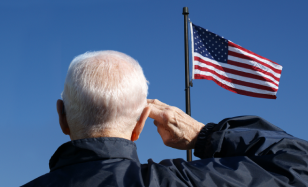What Are the Neurological Effects of Camp Lejeune Water?
The dangerous chemicals found in the water supply at Camp Lejeune in North Carolina have been connected to various neurological diseases that affect the brain and the nerves that run throughout the body.
Military personnel, their families, and civilian workers who spent time on the base from 1953 to 1987 may be at risk of developing Camp Lejeune neurological diseases.
Neurological disorders linked to the toxic water include:
- Amyotrophic lateral sclerosis (ALS or Lou Gehrig’s disease)
- Multiple sclerosis (MS)
- Parkinson’s disease
These health conditions can make it difficult for people to concentrate, learn, work, and enjoy time with family and friends. In many cases, Camp Lejeune water contamination neurological effects can be so debilitating that victims may have difficulty walking or talking.
The Camp Lejeune Justice Act (CLJA), passed in August 2022 as part of the PACT Act, allows victims and their families to file a claim and pursue compensation for certain health problems related to the contaminated drinking water.
Individuals with Camp Lejeune water contamination neurological effects may be entitled to compensation for the pain they’ve endured. The deadline to take action is August 10, 2024.
Don’t delay: See if you can work with a top Camp Lejeune lawyer in our network during a free case review.
Did the Water at Camp Lejeune Cause Neurological Problems?
Yes, it’s possible that the contaminated water at Camp Lejeune caused some residents to suffer neurological issues. In some cases, Camp Lejeune water contamination neurological effects may not appear until decades after exposure to the water.
The Agency for Toxic Substances and Disease Registry (ATSDR) found dangerous chemicals known as volatile organic compounds (VOCs) in the water on base. The contamination came from dry cleaning solvents, fuel leaks, and on-base activities by the military.
The hazardous chemicals found in the water supply included:
- Benzene
- PCE (perchloroethylene, also known as tetrachloroethylene)
- TCE (trichloroethylene)
- Vinyl chloride
Government agencies, including ATSDR and the Centers for Disease Control and Prevention (CDC), have linked these chemical exposures to dozens of adverse health effects, including Parkinson’s disease.
Military service members stationed at Camp Lejeune between 1975 and 1985 had a 70% higher chance of developing Parkinson’s disease than those stationed at Camp Pendleton in California, according to a study published in JAMA Neurology.
Research has also connected the toxic chemicals in the water to other neurological effects, including issues related to memory, visual perception, attention, and mood (depression and confusion).
TCE, for example, is a known human carcinogen that may cause central nervous system defects in children. Long-term exposure to PCE has been shown to cause changes in brain chemistry in animal studies.
Symptoms of Camp Lejeune Neurological Diseases
While Camp Lejeune water contamination neurological effects like Parkinson’s disease, ALS, and MS present in different ways, they share some common symptoms.
Symptoms that could indicate Camp Lejeune neurological effects include:
- Balance difficulties
- Behavioral disorders
- Breathing or swallowing problems
- Changes in posture, walking, or facial expressions
- Confusion
- Depression or anxiety
- Headaches
- Memory loss
- Motor function impairment
- Muscle weakness or twitching
- Numbness or tingling in the arms or legs
- Problems thinking and learning
- Sensory disturbances
- Slurred speech
- Tight and stiff muscles
- Vision problems
Camp Lejeune water contamination neurological effects may progress slowly, and in many cases, a specialist is needed to make an accurate diagnosis and provide treatment.
“Understanding symptoms of neurological disorders is important, as it can lead you to an appropriate diagnosis and treatment.”
– Banner Health
If you or a family member lived or worked on the military base and are now showing symptoms of Camp Lejeune water contamination neurological effects, consider making an appointment with your health care provider. Be sure to tell them about the time you spent on base to see if you may be eligible for compensation.
Next, reach out to our Camp Lejeune case managers at (888) 726-9160 or fill out our online form for a free consultation. There’s no cost to speak to a member of our team.
Filing a Lawsuit for Camp Lejeune Neurological Diseases
The Camp Lejeune Justice Act provides a way forward for all victims of the contaminated water, as they may be able to file a Camp Lejeune lawsuit and pursue compensation to help pay for medical bills and other expenses.
You may be able to file a lawsuit for Camp Lejeune neurological diseases, like Parkinson’s disease, ALS, or MS, if you spent at least 30 days at Camp Lejeune between 1953 and 1987 and later developed a neurological condition.
If a loved one suffered from a Camp Lejeune health issue and later passed away, you may be able to file a wrongful death lawsuit on their behalf — even if they died decades ago.
While the process will vary from case to case, the basic steps of a Camp Lejeune water contamination lawsuit are outlined below.
- Connect with a Camp Lejeune lawyer: A Camp Lejeune lawyer can file a lawsuit on your behalf and pursue justice and compensation for the suffering you’ve endured. Get a free case review right now to see if you may be eligible to work with a top Camp Lejeune attorney in our network.
- File the Camp Lejeune lawsuit: Your Camp Lejeune lawyer will collect evidence showing that the toxic water caused your health problem and proving your damages. They will ensure that your lawsuit is filed correctly and before the August 2024 deadline.
- Fight for maximum compensation: Your lawyer will try to negotiate a Camp Lejeune settlement with the federal government to secure as much money as possible. If a settlement can’t be reached, they will argue your case in court.
Settlement Amounts for Camp Lejeune Neurological Diseases
As of January 24, 2024, two Camp Lejeune victims with Parkinson’s disease have settled their claims by accepting payments — one for $250,000 and another for $400,000 — from the U.S. government through its Elective Option (EO).
These expedited payouts can range from $100,000 to $400,000 for victims with Parkinson’s disease, depending on how much time they spent on base, with an additional $100,000 available to families with a loved one who passed away from the disease.
Learn more about the Elective Option for Parkinson’s disease in the chart below.
| Qualifying injury | 30-364 days on base | 1-5 years on base | More than 5 years on base |
|---|---|---|---|
| Parkinson’s disease | $100,000 | $250,000 | $400,000 |
Legal experts predict that those who push forward with Camp Lejeune lawsuits instead of accepting an EO payout may be awarded more money, although it could take them more time to reach a settlement and get compensation.
Legal Help for Camp Lejeune Contaminated Water Neurological Effects
The toxic water at Camp Lejeune put many Americans at an increased risk of serious health conditions, including debilitating neurological issues. A Camp Lejeune law firm may be able to help you get compensation and justice for all you’ve endured.
Our legal partners have already helped over 30,000 families with their Camp Lejeune claims, including claims for Camp Lejeune water contamination neurological effects.
They can handle Camp Lejeune claims in all 50 states — and they never charge any upfront or hourly fees.
Contact us at (888) 726-9160 right now for a free case review.
FAQs About Camp Lejeune Water Contamination Neurological Effects
What other health conditions were caused by Camp Lejeune water?
In addition to several Camp Lejeune neurological diseases, the toxic drinking water has been linked to many other health issues, including more than a dozen types of cancer.
Camp Lejeune health problems include:
- Aplastic anemia
- Birth defects
- Bladder cancer
- Breast cancer
- Cervical cancer
- Esophageal cancer
- Female infertility
- Heart disease
- Hepatic steatosis (fatty liver)
- Hodgkin’s lymphoma
- Kidney cancer
- Leukemia
- Liver cancer
- Lung cancer
- Lymphoma
- Multiple myeloma
- Myelodysplastic syndromes
- Non-Hodgkin’s lymphoma
- Pancreatic cancer
- Prostate cancer
- Rectal cancer
- Renal toxicity (kidney failure)
- Sarcoma
- Scleroderma
Can contaminated water cause neurological problems?
Yes, contaminated water, like that found at U.S. Marine Corps Base Camp Lejeune, can cause neurological issues.
For example, the base’s toxic water supply has been linked to Parkinson’s disease, amyotrophic lateral sclerosis (ALS or Lou Gehrig’s disease), and multiple sclerosis (MS).
What is considered a neurobehavioral effect of Camp Lejeune water?
Neurobehavioral effects refer to symptoms a person experiences due to a neurological condition. These symptoms include loss of memory, anxiety, depression, learning problems, mood changes, and post-traumatic stress disorder (PTSD).
In many cases, victims may not realize that they are suffering from Camp Lejeune water contamination neurological effects.
If you or a loved one are experiencing neurobehavioral deficits, see a doctor as soon as possible and tell them about the time you spent on the military base.
What effects did the Camp Lejeune contamination have on humans?
Camp Lejeune toxic exposure has caused many to suffer serious and life-altering health conditions.
These health problems include more than a dozen types of cancer and Camp Lejeune neurological diseases like:
- Amyotrophic lateral sclerosis (also known as ALS or Lou Gehrig’s disease)
- Parkinson’s disease
- Multiple sclerosis (MS)
Can you sue for Camp Lejeune neurological disorders?
Yes, you may be able to file a lawsuit for Camp Lejeune water contamination neurological effects. To do so, you must have spent 30 days on base between 1953 and 1897 and developed a health condition related to the chemicals in the water.
A Camp Lejeune lawyer may be able to file a lawsuit on your behalf and pursue the justice and compensation you deserve.
Get started right now with a free case review.
 Get Legal Help Now
Get Legal Help Now
